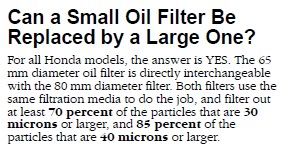Originally Posted By: akela
Originally Posted By: WellOiled
Originally Posted By: akela
Originally Posted By: crazyoildude
I did notice that the media felt a lot easier to tear than an older ocod or even an older Bosch or an a/c
that's very interesting.
I'm wondering, if it would be possible to build a simple "tearometer" that would measure the force required to tear, say, a 1/4" strip of the filter media.
A simple pull test would be very easy to setup and perform.
The key would be how the media should be prepped. Soak in an oil water mix or just soak it in water and then do the pull test.
Compare all the filter media with respect to pull strength.
The results might be interesting.
I'd expect comparative "dry" test to be well-correlated with "oiled". That is, if media A is weaker than media B when dry, it is likely also to be weaker if oiled.
I guess oil manufacturers have this equipment and perform such tests. They wouldn't share the results though.
I mentioned water because that would be worst case. Vehicles with short trip history may have condensation buildup that may not get burned off.
For reasons just like this, a simple pull test might not be very useful and correlate with anything real world.
Originally Posted By: WellOiled
Originally Posted By: akela
Originally Posted By: crazyoildude
I did notice that the media felt a lot easier to tear than an older ocod or even an older Bosch or an a/c
that's very interesting.
I'm wondering, if it would be possible to build a simple "tearometer" that would measure the force required to tear, say, a 1/4" strip of the filter media.
A simple pull test would be very easy to setup and perform.
The key would be how the media should be prepped. Soak in an oil water mix or just soak it in water and then do the pull test.
Compare all the filter media with respect to pull strength.
The results might be interesting.
I'd expect comparative "dry" test to be well-correlated with "oiled". That is, if media A is weaker than media B when dry, it is likely also to be weaker if oiled.
I guess oil manufacturers have this equipment and perform such tests. They wouldn't share the results though.
I mentioned water because that would be worst case. Vehicles with short trip history may have condensation buildup that may not get burned off.
For reasons just like this, a simple pull test might not be very useful and correlate with anything real world.

